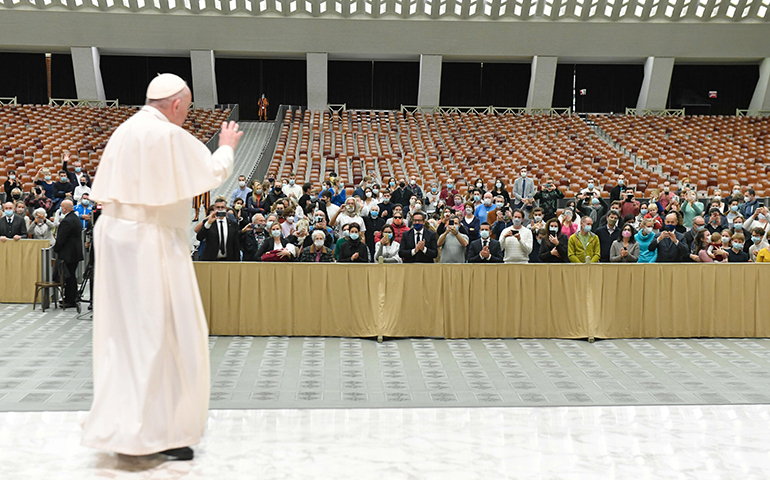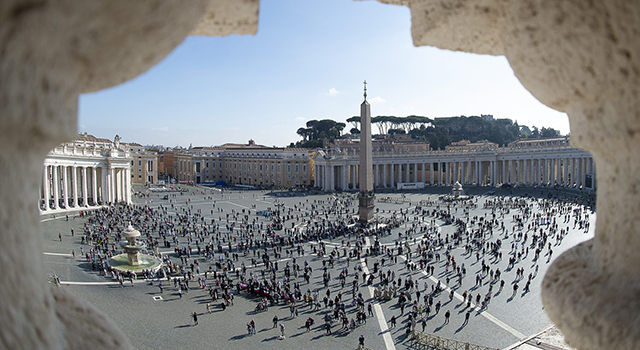By Jose Antonio Varela Vidal -

Photographer: Vatican Media/CNA
Pope Francis gave the Wednesday general audience with a limited number of pilgrims inside the Vatican's Paul VI Audience Hall, Oct. 28, 2020.
"¿Por qué tanto brinco, si el suelo está parejo?" (Why so much jumping, when the ground is flat?) is a saying used in the Spanish language to tell someone not to make a fuss about an inconsistency. In other cases, it is used when someone wants to shock a group, to warn them that he or she is coming well-informed and with clear ideas.
This old saying could well apply to the documentary "Francesco," which the American Israeli filmmaker, Evgeny Afineevsky, released in mid-October with a broad press strategy in which he highlighted some unknown opinions of Pope Francis about homosexuals.
That is how, after a prudent amount of time — in Vatican style, where they do not usually take reactive actions — the bishops of the world received the official position of the Holy See regarding the declarations mentioned above. For those who wondered if the leader of Catholics had changed the doctrine about the family, the ground remains flat.
LOVE AND DO WHAT YOU WILL
The aforementioned Vatican letter of Nov. 2, 2020 was written to offer "useful elements, with the desire to foster a correct understanding of the Holy Father’s words" in the documentary. It clarifies that, over a year ago, the pope answered two different questions, at two different moments of a media interview. The director of the documentary joined them in a single answer, and this has caused some confusion, which the letter explains clearly.
In reference to the first declarations, in the sense that, within the family, a daughter or son with homosexual orientation should never be discriminated, much less thrown out of the family, the letter recalls what Pope Francis’ apostolic exhortation, Amoris Laetitia, states. In section 250, it says, "In regard to families, it’s about their ensuring a respectful accompaniment, so that those that manifest a homosexual tendency can count on the necessary help to understand and carry out fully the will of God in their life."
As we can see, this disposition towards those in one's own family forms part of the backbone of Christian charity, which is sometimes exercised with the help of the supernatural. This is because one must appeal to the motives of the heart when reason cannot understand everything. It is there where God's love nests and grows, especially in parents.
TO CESAR WHAT BELONGS TO CESAR
With regard to the second group of statements included in the documentary, the pope is heard advocating for the legal concept of "civil unions," referring to what he suggested at one point in his native country. He suggested this 10 years ago during a legislative debate about persons of the same sex who had established a binding relationship due to time and circumstance.
The Vatican letter explains that what was said was a proposal by the pope in the Argentine civil arena, as an opposing response to a local law on "egalitarian marriages of same-sex couples," which at the time the then Archbishop of Buenos Aires described as "an incongruence."
Nevertheless, in the face of a manifest reality in which the secular states want to justify such civil unions in order to regulate economic aspects, such as an inheritance or to guarantee health care, Pope Bergoglio — already in his capacity as Peter's successor — noted in another interview that "it’s necessary to look at the different cases and to evaluate them in their variety."
The Holy See's letter concludes that it is clear that the Holy Father "was referring to specific State dispositions, certainly not to the doctrine of the Church, confirmed numerous times in the course of the years."
MARRIAGE AND A SHROUD, FROM HEAVEN COME DOWN
Clearly, the pope's statements referenced the mission of the family as a model of humanity, which must welcome into its bosom those who have been the fruit of love: children. And in an underlying way, he referred to the Church, which in its condition as a proactive entity in the midst of the society in which it has to develop, will always see to it that States do the greatest possible good for their citizens and that there are no exclusions that bring more pain.
Independently of this, and for those who know Catholic morality, it is evident that there is no room for "equality in marriage" among persons of the same sex. This is something that the Church cannot even reconsider, since the origin of marriage between a man and a woman, biologically differentiated, open and capable of creating life in a natural way, is rooted in the biblical story of Genesis.
To this natural desire — categorized as divine law or natural law — were later added the exegesis of the Church's fathers and the subsequent theology and papal magisterium up to the present day. Therefore, it does not seem possible that the Church can undo such a solid base as the family itself, which has always been encouraged to be built on a foundation of faithfulness, legality and passion.
In order to warn of the risk of altering this foundation, Pope Francis wrote in paragraph 251 of Amoris Laetitia: "It is unacceptable that local Churches should be subjected to pressure in this matter and that international bodies should make financial aid to poor countries dependent on the introduction of laws to establish ‘marriage’ between persons of the same sex."
It seems that with the latter, the Holy Father wanted to paraphrase the well-known saying: "Forewarned is forearmed."
A version of this column was originally published in the November issue of La Voz Católica.

